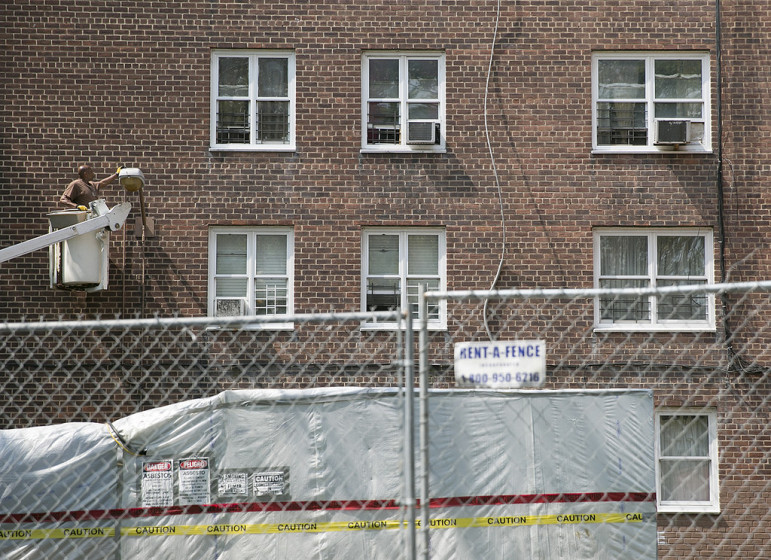
William Alatriste for the New York City Council
Repairs at the Red Hook Houses.
Fully one quarter of New York City Housing Authority buildings are considered to have severe repair needs, the authority’s chairwoman told the City Council’s public housing committee on Thursday, where committee head Councilman Richie Torres questioned whether the city was doing enough for NYCHA.
NYCHA’s continually rising operating costs, most of which are due to employee benefits, coupled with the cumulative loss of funding, has resulting in an unsustainable existing model, NYCHA Chair Shola Olatoye said. She expects a $400 million deficit by the year 2025. That doesn’t include the $16 billion in unfunded capital needs, which contribute to operating costs. “We saw that maintenance work orders went down by 49 percent after we invested $33 million in significant capital repairs at Marlboro Houses,” Olatoye said.
Olatoye’s report wasn’t all bad news. Last year, the “Food Business Pathways Program” provided free training to residents who want to start their own food business. NYCHA also connected more than 2,000 residents with jobs. Olatoye said that in her first year as chair, she was able to close a $281 million operating deficit for fiscal year 2014, the first time NYCHA balanced its budget in 10 years. “This was made possible by generous and historic support from Mayor de Blasio and the City Council,” Olatoye said, who frequently referred to the mayor’s support throughout her remarks.
Specifically, the mayor forgave NYCHA’s $122 payments to the NYPD for 2014-2015. NYCHA also negotiated lower energy rates from HUD and garnered $13 million in subsidies. A Section 8 public/private partnership brought in $158 million and will continue to fund capital repairs over the next 15 years. Reigning in overtime spending also contributed to closing the budget, but had an unfortunate side-effect of longer wait times for work orders.
Generally, though, things aren’t looking up. “We are projecting an 89 percent proration of federal operating funds in 2015, which translates to a loss of about $115 million in funding,” Olatoye said. And about 25,000 families face rent adjustments. Furthermore, the waiting list for NYCHA is about 250,000 long, with an average wait time of 10 years. The wait-list for Section 8 is 100,000 strong.
After her address, the chair fielded questions from Torres and others. Torres asked how many of the developments are in danger of being lost to disrepair. Olatoye explained that NYCHA ranks each of the developments in its portfolio on a scale of one to five, with five being the worst. Fully 25 percent of NYCHA’s buildings are in category 5, Olatoye said, and are being kept up by dedicated staff, who are repairing leaky roofs and ceilings “with foam and chewing gum” to keep buildings operational, Olatoye said.
Another topic raised was the number of apartments NYCHA is allocating to fighting homelessness. Olatoye told the committee that though she was tasked by the mayor with providing housing for 750 homeless families, NYCHA exceeded that, placing more than 280 families in Section 8 housing, too.
But Councilman Donovan Richards pushed her on the point, asking if NYCHA can do more to help ameliorate homelessness and provide more units. A number of homelessness activists in the audience murmured their assent, and Councilman Torres jumped in to ask who determines how many of these families are placed in NYCHA. Olatoye said that NYCHA has a priority list that requires the approval of HUD, but acknowledged that it was the de Blasio administration that made the determination.
Committee Chairman Torres ended the meeting by bringing up the $30 million a year that NYCHA pays the city in property taxes, expressing dismay that property developers and even Madison Square Garden receive tax exemptions, but the city’s beleaguered public housing does not.
He closed the hearing with a powerful observation: “If we can give tax exemptions to Madison Square Garden, we should be able to give tax exemptions to NYCHA.”









4 thoughts on “NYCHA Foresees $400M Deficit in a Decade”
It is the 21st Century…2015! In this day in age,homelessness should not exist!
We are the richest city & the richest country in the world…there is no reason
whatsoever,why we should still have a vast homeless problem in a city like this!
‘Nuff said!
Pingback: News Round-up | Murphy Institute Blog
Time for the Dolan brothers to pay taxes.
Pingback: What’s Brewing? This Week’s Must Read Link Roundup - The BQ Brew